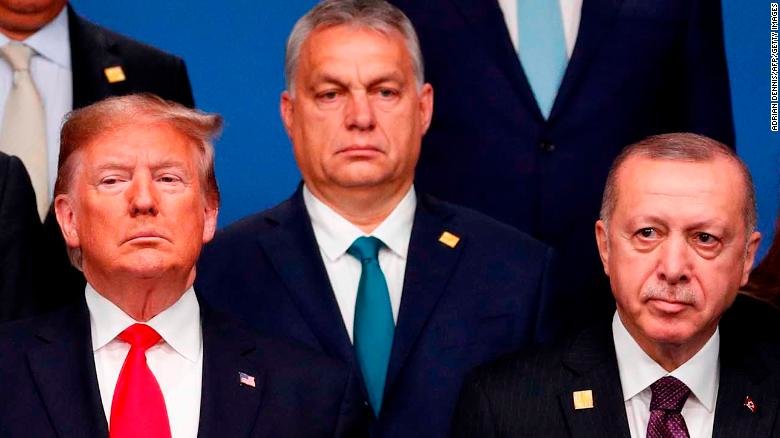
Analysis: Trump's loss dealt a blow to global populism. But the movement is still alive and kicking

US President Donald Trump, from left, with Hungarian Prime Minister Viktor Orbán and Turkish President Recep Tayyip Erdogan at the NATO summit in London on December 4, 2019.
For four years, Donald Trump has been the world's standard-bearer for right-wing populism. The movement didn't begin with Trump, but the US President championed it in a way no other leader could, using the weight of the most powerful office on Earth to give it legitimacy.
His election loss naturally dealt a blow to populist leaders, particularly those who share Trump's autocratic streak. Many had used the President's anti-migration, xenophobic, sexist and anti-LGBTQ policies and rhetoric to justify their own. That cover has now gone.
But that doesn't necessarily mean the populist wave has crested -- not in the United States, nor the world at large.
President-elect Joe Biden won the Electoral College vote fair and square, but he did so on the thinnest of margins in a handful of key states. Trump still garnered over 47% of the popular vote, more than 73 million ballots. The results were hardly a riposte to the President's divisive, populist leadership.
If support for populism has eroded in the US, it has done so only marginally, and the same can be said for much of the world.
The pandemic has done little to dampen global populism. Trump almost certainly paid a political price -- an election exit poll showed that the majority of voters (52%) considered containing the virus a more important issue than rebuilding the economy (42%). But he still won over nearly half the country's voters, despite his bungled response and more than 260,000 American deaths.
In the early months of the pandemic, countries with stronger democracies appeared to be faring better than those with strongman populist leaders. But as the pandemic ebbs and flows, that assumption is being challenged.
Brazil and India -- which, like the US, have populist leaders -- might be suffering with soaring infection and death rates, but so too is Western Europe, a bastion for liberal democracy. Even Germany, earlier celebrated for what looked like a model response to the virus, is finding its huge hospital network under strain as it struggles to keep the virus at bay.
Several autocratic populists saw their approval ratings dive in the midst of the pandemic, but many have recovered remarkably fast.
In Brazil -- despite what looks from afar like a blatant failed response to the virus, akin to America's -- recent polling shows President Jair Bolsonaro is enjoying the highest approval ratings of his term. It's in part to do with state payments to compensate Brazilians who have lost jobs or income, and that scheme could soon come to an end. But that Bolsonaro has come this far politically unscathed by his chaotic pandemic response speaks volumes about Brazilians' faith in him.

It's the same story in Russia. President Vladimir Putin's approval rating fell to a historic low in May, to 59%, as the country battled a spike in coronavirus infections, Levada-Center polling shows. But that was short lived. Putin is back up to 69%, in line with levels over the past two years, even as Russia battles a challenging second wave of Covid-19.
Turkish President Recep Tayyip Erdogan has done well out of the pandemic too. His popularity rose sharply at its onset, and while it dipped below 50% during the hard spring and summer, it has since recovered and is now higher than in recent years, a MetroPOLL survey shows. That's despite cases in the country trending upward.
Populist leaders in Asia are also showing little sign of fading away. In India, Prime Minister Narendra Modi's Bharatiya Janata Party (BJP) -- a right-wing Hindu nationalist outfit -- and its allies won the country's first Covid-era election earlier this month in the state of Bihar, which they were expected to lose.
Philippine President Rodrigo Duterte's popularity hit a record high last month.
In central Europe, some leaders even appear to be doubling down on their divisive policies. In Poland, the ruling Law and Justice (PiS) party is trying to push ahead with a draconian law on abortion that has been met with widespread opposition. And in Hungary, Prime Minister Viktor Orbán recently proposed electoral law changes to tighten his grip on the country, where his party already holds a super-majority in parliament. He is also trying to enshrine in law transphobic definitions of gender.
Even in some countries where populist leaders are not in power, the movement is flourishing. A recent poll by the French Institute of Public Opinion found that if France had held an election in October, the far-right National Rally's Marine Le Pen would garner around the same number of votes as French President Emmanuel Macron in a first round.
"Populist movements come from long-term cultural shifts, so you wouldn't necessarily expect them to fade away, even if the brand's image gets damaged by losing Trump as its global leader," Pippa Norris, from Harvard University's Kennedy School of Government, told CNN.
The current populist wave was triggered by a number of major events, like the 2007-08 financial crisis and the mass movement of refugees into Europe in 2015, which propelled several anti-migration populist parties into parliamentary chambers across the region, Norris said.
"And then we had Brexit in the middle of 2016, and if that hadn't been held during the refugee crisis, I do think the results could have gone the other way," she said.
"But we should remember that Trump was both a consequence and a cause of the changes around that time. In Europe, autocratic populism was already rising."
What's next?
As Norris points out, populism tends to flourish in times of crisis, particularly of the economic kind.
The International Monetary Fund projects the world economy to contract by 4.4% in 2020. That's far worse than the 1% fall in 2009, following the devastating financial crisis, when global unemployment leaped to 212 million people, a 34 million-person jump from 2007 before the crisis really set in.
The pandemic, however, is proving an unpredictable force. Some leaders who have been more successful in their responses are enjoying a boost to their popularity -- New Zealand Prime Minister Jacinda Ardern and Australian Prime Minister Scott Morrison, for example. But Bolsonaro, Putin and Erdogan are all enjoying the same spoils.
In Europe, it may be more useful to focus on Biden's victory, rather than Trump's loss. Daphne Halikiopoulou from the University of Reading in England said the US election could reinvigorate the left and center-left, which had broadly failed to respond to the 2007-08 financial crisis and "imploded" as a result.
"If Trump had won, there would have been jubilation [among far-right populists], because they could have said, 'Look, our ideas are mainstream,'" Halikiopoulou said.
"But one signal to take from the US election is that the left can find it again ... find an electorally successful recipe."
In Brazil, municipal elections going on now might offer an insight into how long Brazilians may want to keep populist leaders in power. But their real report will come in 2022, when Bolsonaro is likely to stand for another term.
"Bolsonaro appears to be visibly upset at what has happened in the US because it raises the specter of his own potential electoral failing in his bid for reelection in two years," said Mark Langevin, director of the consultancy BrazilWorks.

But it seems Bolsonaro may be learning already. He is toning down his public admiration for Trump and taking advice from his team to be less aggressive than his American counterpart, Langevin observes.
"The minister for communications, Fábio Faria, has convinced Bolsonaro to limit his personal communications with the press, and simply travel around Brazil and parade himself with his groupies in all sorts of destinations around Brazil, where he doesn't really say anything, but is seen eating a pastel [pastry] with local politicians. And that's been working great for him. Brazilians love that stuff."
The year 2022 will be populism's true barometer, not just in Brazil, but in countries like France, where the presidential election could be another race between centrist Macron and far-right populist Le Pen, or Hungary, which will also decide on whether to continue on Orbán's populist, anti-migration and euroskeptic path or to try something else.
But the US will again be the big one to watch. Americans will have their say in midterm elections, in which they will either reinforce their support for Biden or hand greater powers back to the Republicans, who are unlikely to abandon the populist Trumpism that gave their party new life.











